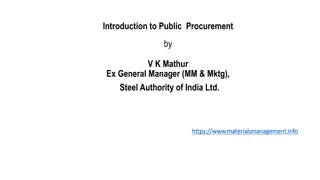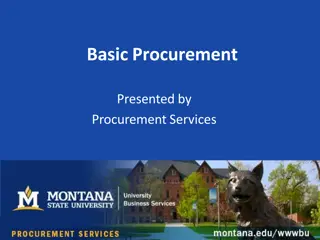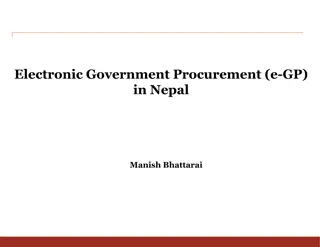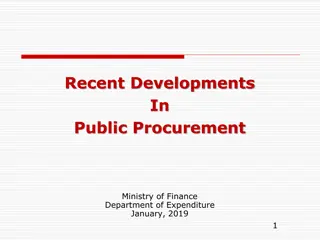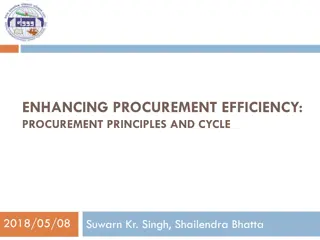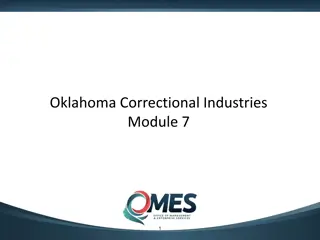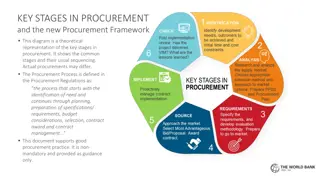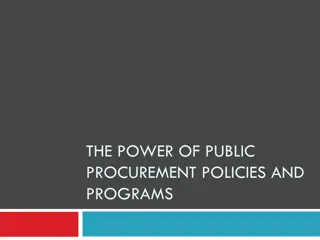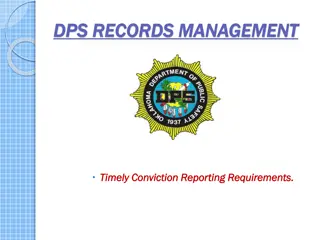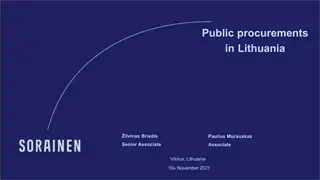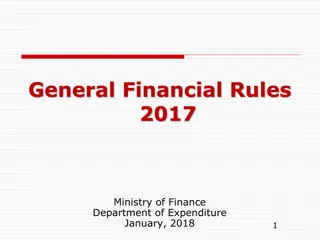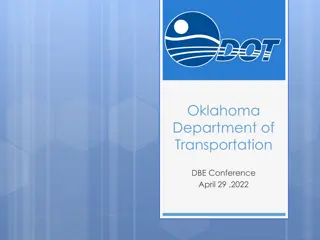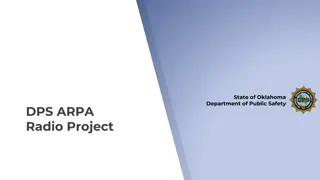Oklahoma Procurement Regulations Overview
Learners in this module will understand the nuances of procurement regulations in Oklahoma, including topics such as express vs. implied authority, the Central Purchasing Act, agency hierarchy, and the role of constitutions, statutes, and rules in governing procurement activities. The content emphasizes the importance of understanding regulatory authority, internal procedures, and the Oklahoma Constitution in the context of procurement processes.
Download Presentation

Please find below an Image/Link to download the presentation.
The content on the website is provided AS IS for your information and personal use only. It may not be sold, licensed, or shared on other websites without obtaining consent from the author.If you encounter any issues during the download, it is possible that the publisher has removed the file from their server.
You are allowed to download the files provided on this website for personal or commercial use, subject to the condition that they are used lawfully. All files are the property of their respective owners.
The content on the website is provided AS IS for your information and personal use only. It may not be sold, licensed, or shared on other websites without obtaining consent from the author.
E N D
Presentation Transcript
Regulations of Oklahoma Procurement Module 2 1
Learner Outcomes Students will: Describe the difference between express and implied authority. Identify the title where the Central Purchasing Act resides. Name who has sole and exclusive authority and responsibility for all acquisitions used or consumed by state agencies. List the title of state agency purchasing officials and their duties related to procurement. Name the title of purchasing staff who demonstrate proficiency in principles of state procurement practices and who appoints them. Recall the continuing education requirements to retain a Certified Purchasing Officer certification. Memorize the minimum provisions that should be included in state agency internal purchasing procedures. Identify the process for agency one-time purchasing exception. 2
Hierarchy of Regulatory Authority Generally, federal regulations supersede state regulations. When there s a discrepancy, the strictest regulation applies. Sometimes the agency procedures are stricter than other government regulations. The strictest regulation always applies. 3
Constitutions, Statutes and Rules Constitutions and Statutes Provide specific guidance to conduct procurement activities. Rules Provide flexible operating metrics needed to implement the statutes. Provide guidance that may be further clarified by agency internal procedures. 4
Constitutions, Statutes and Rules Constitutions, statutes and rules tell the what or why. Internal procedures tell how the procurement transaction is to occur. 5
Oklahoma Constitution Oklahoma Constitution, adopted in 1907 by the people of Oklahoma as the governing document of the state. Provides for the rights and privileges of citizens. Article IV, Section 1 broadly divides the powers of each branch of government. Legislative. Executive. Judicial. 6
Legislative Branch Constitutional authority to make law to govern the people and processes of the state. May delegate its power and discretion to others to carry out governmental functions. The Oklahoma State Legislature has enacted statutes creating the Office of Management and Enterprise Services (former Office of State Finance/Department of Central Services) and delineating the authority of the department with respect to purchases made on behalf of the state, all in accordance with the constitution. 7
Executive Branch The governor is charged with the execution of laws. Article VI, Section 8 of the Oklahoma Constitution provides that [t]he Governor shall cause the laws of the State to be faithfully executed. Section 8 of the constitution further requires the governor to conduct all business of the state, either in person or as allowed by law. If authorized by law, the governor may appoint others to help accomplish the mighty task of conducting all state business. 8
The Legislative Delegation Model Legislatures delegate significant law-making authority to government agencies. Delegation, in this case, is the extra legal authority to government agencies to write and administer law subject to Legislative Oversight. 9
Legislative Oversight Legislative Oversight is the process of review and approval of administrative rules, regulations, policies and procedures such as the Oklahoma Administrative Code. A fundamental objective of legislative oversight is to hold executive officials accountable for the implementation of delegated authority. 10
Central Purchasing Administrative Rules The Central Purchasing Administrative Rules are hosted on the OMES website: http://www.ok.gov/DCS/Central_Purchasing/CP_Processes,_Rules_&_Statutes/index.html They changed in September 2014 under OAC 260. 11
Central Purchasing Administrative Rules These rules are administered by Central Purchasing to provide direction and ensure compliance with the Oklahoma Central Purchasing Act, and other state laws and rules, which may be applicable to state agency acquisitions. 12
Central Purchasing Administrative Rules The purpose of these rules is to: Provide information and procedures for bidders and suppliers who desire to sell products and services to state agencies; Provide information and procedures for state agencies subject to the Central Purchasing Act; and Establish fair and consistent purchasing processes that satisfy the needs of the state. All bidders, suppliers and state agencies are responsible for knowing the requirements of these rules. 13
Delegation of Authority Oklahoma State Law OMES Central Purchasing Agency Procurement Procedures Procurement Professionals 14
Central Purchasing Act Title 74 O.S. 85.1 All state agency activities relating to purchasing shall be under the direction of Central Purchasing unless otherwise provided by the Oklahoma Central Purchasing Act. 15
Office of Management and Enterprise Services Title 74, Section 61.1 of the Oklahoma Statutes directs that the governor shall appoint the director of the Office of Management and Enterprise Services. The director, pursuant to statutory authority and executive power, is charged with the responsibility to administer and enforce our state purchasing laws within the executive authority. The Office of Management and Enterprise Services serves its legislative purpose by providing a means by which state agencies may make contracts for the acquisition of goods, services and supplies needed in an economic and efficient manner. 16
Central Purchasing The director of OMES is further required by statute to hire the director of Central Purchasing in section 85.3 of title 74. Within each title, the statutes are divided into subgroups relating to the laws about a particular subject or act. One such act entitled The Oklahoma Central Purchasing Act is located in Title 74 O.S. 85.1-85.44C, 85.45j-85.45k. These statutes provide detailed information to purchasing officers, agencies, vendors and the public concerning how agencies may make purchases and contract for the goods and services needed from suppliers through the Office of Management and Enterprise Services. 17
Central Purchasing 85.5 the State Purchasing Director, under the supervision of the Director of the Office of Management and Enterprise Services, shall have sole and exclusive authority and responsibility for all acquisitions used or consumed by state agencies. Authority like this which is designated in writing is called express authority, whereas authority that is inferred from the acts of parties is implied authority. 18
Chief InformationOfficer The chief information officer shall have sole and exclusive authority and responsibility for all acquisitions of information and telecommunications technology, equipment, software, products and related peripherals and services used or consumed by state agencies. 19
Agency Purchasing No state agency, department, or institution subject to the Oklahoma Central Purchasing Act shall have or maintain a purchasing section without the prior approval in writing of the Purchasing Division unless otherwise provided in the Oklahoma Central Purchasing Act. 20
Agency Purchasing State agencies are authorized to make acquisitions not exceeding $5,000 provided: The acquisition process is fair and reasonable. The acquisition process is conducted according to rules authorized pursuant to the Central Purchasing Act. For acquisitions above $50,000 a requisition must be submitted to Central Purchasing. 21
A Fair and Reasonable price is the price point for a good or service that is fair to both parties involved in the transaction. This amount is based on the agreed-upon conditions, promised quality and timeliness of contract performance. In public purchasing, a fair and reasonable price is subject to statutory and regulatory limitations. 22
Agency Purchasing One-Time Purchases Exception State Agencies with: Certified Procurement Officers (CPOs). Subject Matter Expert(s). Legal Counsel. Internal purchasing procedures that are found compliant by the director of the Office of Management and Enterprise Services may apply to OMES for a one-time acquisition in excess of $50,000 and not exceeding $100,000 that does not conflict with a consolidated statewide spend initiative in accordance with the Central Purchasing Act and Central Purchasing Administrative Rules. 23
Agency Internal Purchasing Procedures 85.39. Agency Internal Purchasing Procedures Each state agency shall develop internal purchasing procedures for acquisitions by the state agency. Procedures shall, at a minimum, include provisions for the state agency's needs assessment, funding, routing, review, audits, monitoring, and evaluations. Following development, the state agency shall submit the procedures to the State Purchasing Director. The State Purchasing Director shall review the procedures submitted pursuant to paragraph 1 of this subsection to determine compliance with the Oklahoma Central Purchasing Act, rules promulgated pursuant thereto, Sections 3001 through 3010 of this title, and provisions of paragraph 1 of this subsection. The State Purchasing Director shall provide written findings, including details of noncompliance, if any, to the Director of the Office of Management and Enterprise Services. 24
Agency Internal Purchasing Procedures 85.39. Agency Internal Purchasing Procedures The Director of the Office of Management and Enterprise Services (delegated to State Purchasing Director) shall, within fifteen (15) days after the procedures are submitted, notify the state agency that the procedures are in compliance or indicate revisions necessary to bring the procedures into compliance. A state agency shall not make acquisitions exceeding Five Thousand Dollars ($5,000.00) pursuant to Section 85.5 of this title, unless the Director of the Office of Management and Enterprise Services provides notice of compliance. Each state agency shall maintain a document file for each acquisition the state agency makes which shall include, at a minimum, justification for the acquisition, supporting documentation, copies of all contracts, if any, pertaining to the acquisition, evaluations, written reports if required by contract, and any other information the State Purchasing Director requires be kept. 25
Agency Purchasing OAC 260:115-5-3(b) Certification. The state purchasing director shall certify state agency purchasing officials and other purchasing staff who demonstrate proficiency in principles of state procurement practices, basic contracting, provisions of the Oklahoma Central Purchasing Act, provisions of State Use Committee and other matters which relate to procurement practices. OAC 260:115-5-3 (c) Authority. A CPO shall be authorized to make acquisitions for state agencies. 26
Certified Procurement Officers As a certified procurement officer, you are authorized to make purchases not to exceed an assigned cost threshold: $0-$5,000 $5,001-$10,000 $10,001-$25,000 $25,001-$50,000 $50,001-$100,000* *Requires special authorization from OMES. 27
Certified Procurement Officers Keep in mind that: The thresholds mentioned in the previous slide will never exceed the threshold delegated by your internal agency procedures. Federal statutes, statutes and rules of the State of Oklahoma and the purchasing agency are the source of authority for public procurement. Public procurement authority is delegated by the state purchasing director, and Exceeding the degree of authority conferred through delegation constitutes an unauthorized act. 28
Two-Year CPO Revalidation Requires 24 hours of continuing education units (CEUs). in 24 months beginning at the first of the year following your initial certification. Form 022 must be completed for all courses not appearing on the approved form. All classes need to be pre-approved by Central Purchasing prior to attendance. http://www.ok.gov/OSF/ Central Purchasing CPO Program CEU Report (006A) Course(s) approved for CPO credit 29
Exceeding Authority Resolution may include: Ratifying paying the vendor or returning the product. Sanctions may include: Reducing the person s delegated purchasing amount. Reducing the agency s delegated purchasing amount. Losing purchasing privileges. 30
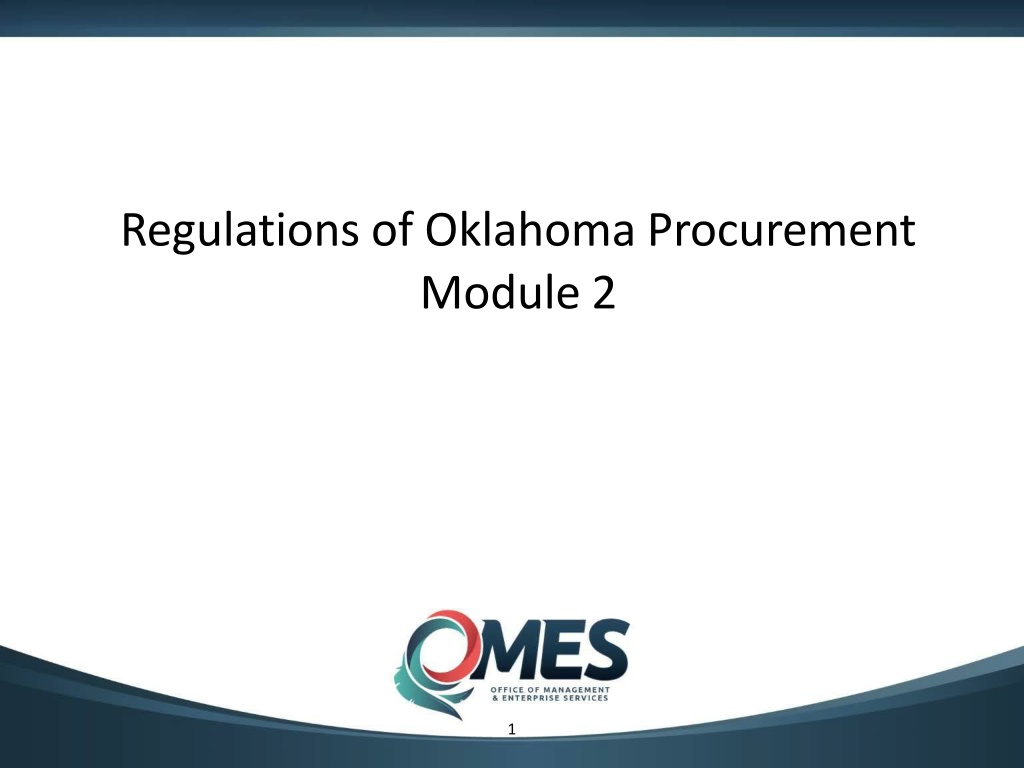






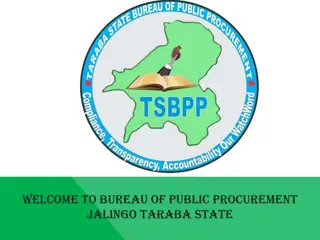
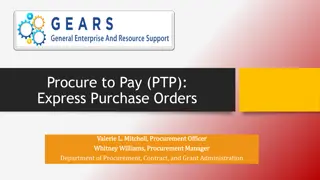


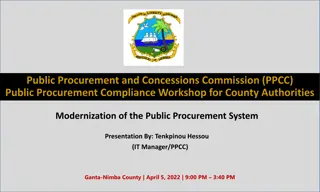
![Comprehensive Overview of Corruption Watch Submission on Public Procurement Bill [B18B-2023]](/thumb/138344/comprehensive-overview-of-corruption-watch-submission-on-public-procurement-bill-b18b-2023.jpg)
